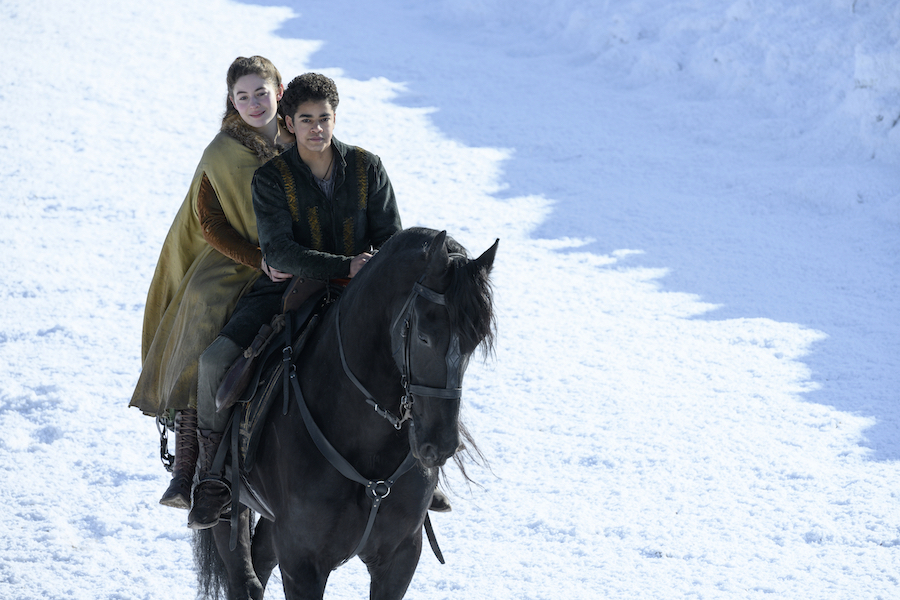The most unique feature of Netflix’s teen knight series “The Letter for the King” might be its proper nouns: Tiuri; Dagonaut; Ardanwen; Unauwen; Lavinia; Evellian, etc. These are the names and places from a world originally created by author Tonke Dragt, and they’re like window dressing for a series that otherwise feels like it’s been built up from medieval cliches. “The Letter for the King” will certainly have a more forgiving audience with younger viewers, especially if they don’t recognize pivotal dramatic beats, character details, or general plot directions. But as quests go, “The Letter for the King” tests the limits of when distracting entertainment is too familiar to be fun.
Amir Wilson plays our underdog hero Tiuri, a young man raised by his powerful stepfather Sir Tiuri the Valiant (David Wenham) to become a knight, even though Tiuri is smaller than others, and not very good with a sword. Sir Tiuri is so focused on getting his adopted son to knighthood that he even rigs a competition, ultimately causing him to be looked down upon by his peers. When Tiuri participates in sacred knight training with his fellow wannabe knights one evening, Tiuri goes rogue from the group to assist an old man pleading for help, one of the story’s first examples of a decent theme about the courage it takes to do the right thing. But Tiuri finds himself responsible for an important letter, handed to him by a soon-to-be-dead man called The Black Knight (Ben Chaplin). We don’t know exactly what the letter says until later (and it becomes one of the less exciting Maguffins in recent storytelling history), but we know that it came from the menacing Prince Viridian of Unauwen (Gijs Blom), who just won a major victory. Every now and then, the show cuts back and forth to show that he is up to no good (like when he murders a shaman and breathes in their powers, for starters), and it becomes one of the series’ many flat portrayals of villainy.
The drama of “The Letter for the King” concerns three kingdoms—Evellian (where Tiuri is originally from), Dagonaut (where Tiuri was raised by his mother and stepfather), and Unauwen (where the letter must go). Even for just three kingdoms, the series can be a little exhausting when keeping track of who is from where (a “Game of Thrones”-like recap might have benefited this series in particular, something Netflix seems largely defiant of). But once you get the gist, “The Letter for the King” can be pretty straightforward—a wide-screen quest through some inspired locations (like a monastery at the top of a mountain), with Tiuri soon receiving help from a princess of Dagonaut named Lavinia (Ruby Ashbourne Serkis), who was originally intended to be married off by her father (Andy Serkis, in a fleeting appearance). They’re the main duo (along with tenacious steed Ardanwen) that travels with the letter to get it to said king, while being chased by Viridian’s Red Riders through the snowy mountains, onto a boat, and toward the kingdom of Unauwen.

Tiuri’s peers are also on his tail, like the lute-playing goofball Jussipo (Jonah Lees), and the lionhearted Iona (Thaddea Graham). They’ve been ordered by their superiors to find Tiuri and the letter, and though they are not particularly villainous, they go along with it. Their own quest provides some padding to the adventure, and some weak (however welcome) attempts at light-hearted humor. Despite formidable ensemble casting work, they always seem just like kids, instead of young people who want to be killer adults. A gap in the story develops—knighthood never registers as a fun concept, instead it’s an obligation by parents. For all the power that comes with being a knight, it equates knighthood with getting through a standardized test.
“The Letter for the King” is clearly aiming for the TV-PG audience who want their own “Game of Thrones” or even “Lord of the Rings,” and it’s hobbled by that rating more than it should be. Any time there’s a threat of large danger, the outcome is predictable because of knowing who can’t be harmed in such a family friendly story, or that a beat of someone sneaking up slowly for a kill just isn’t going to turn out as the would-be murderer planned. (And when there is a brief killing, the series lets an abrupt cut to someone’s shocked reaction do the work.) Given the care that clearly went into the choreography and the cinematography, the show’s sword duels fare better, even if a particular action scene’s tension struggles to raise the show’s overall pulse.
Almost as if it must continue the trend of Netflix series about people who learn they have super powers (from “Wu Assassins” to “I Am Not Okay with This” and beyond), an element of magic is thrown into “The Letter for the King.” Like a lot of the stuff raised here, including an eye-popping climactic battle that looks like it was inspired by a “Final Fantasy” game, it’s a bright element whose promise is snuffed out by dominating mediocrity. First it’s in how Tiuri initially hears voices, making his hero saga seem obvious; then it’s a big reveal about destiny that while surprising, doesn’t have the jaw-dropping impact that prophecies in fantasy stories once had. It’s the kind of detail that might have stood out if this weren’t the thousandth tale to wield it, but it is telling about the whole show—even magic makes “The Letter for the King” seem ordinary.
All of season one screened for review.












